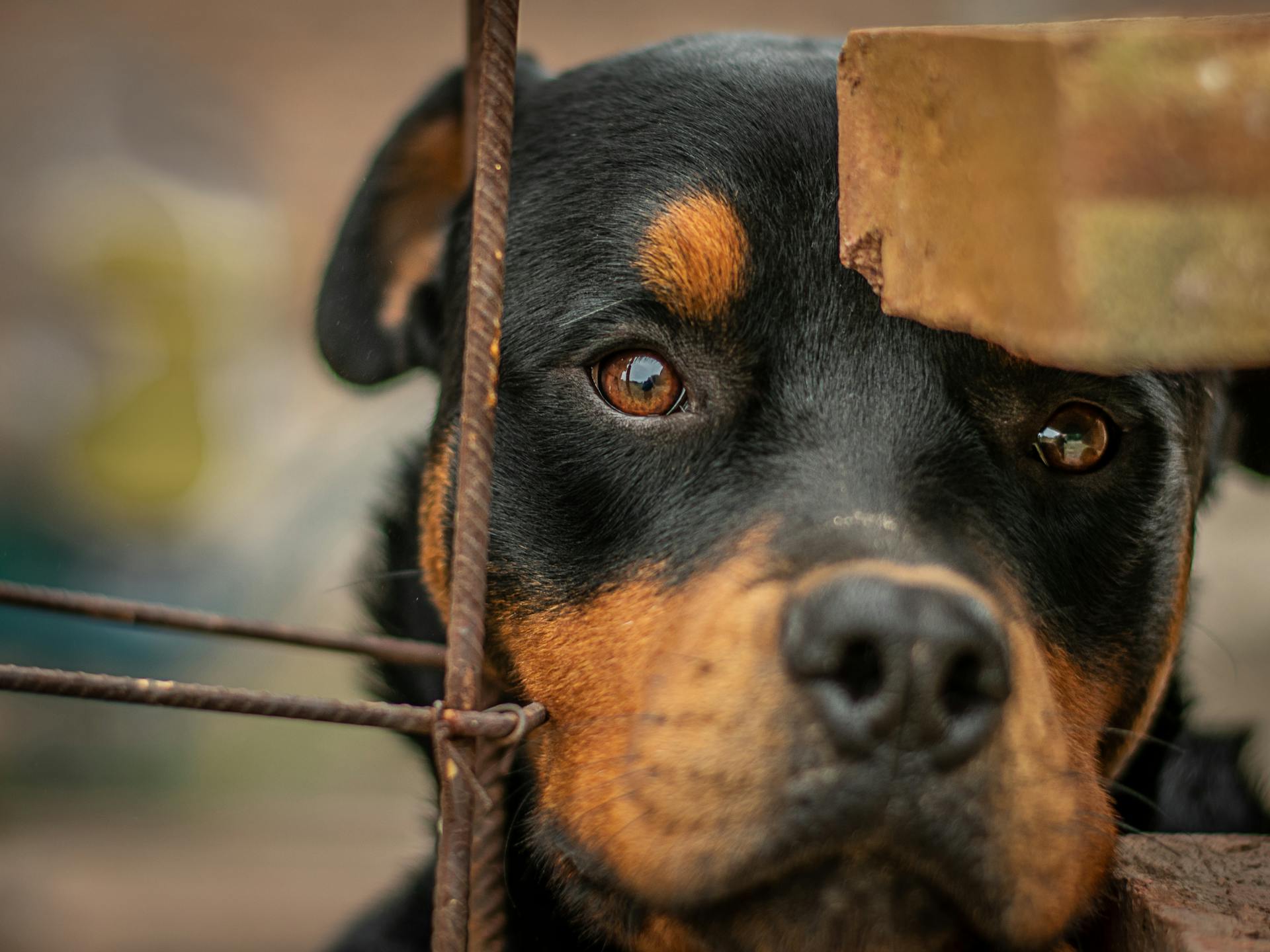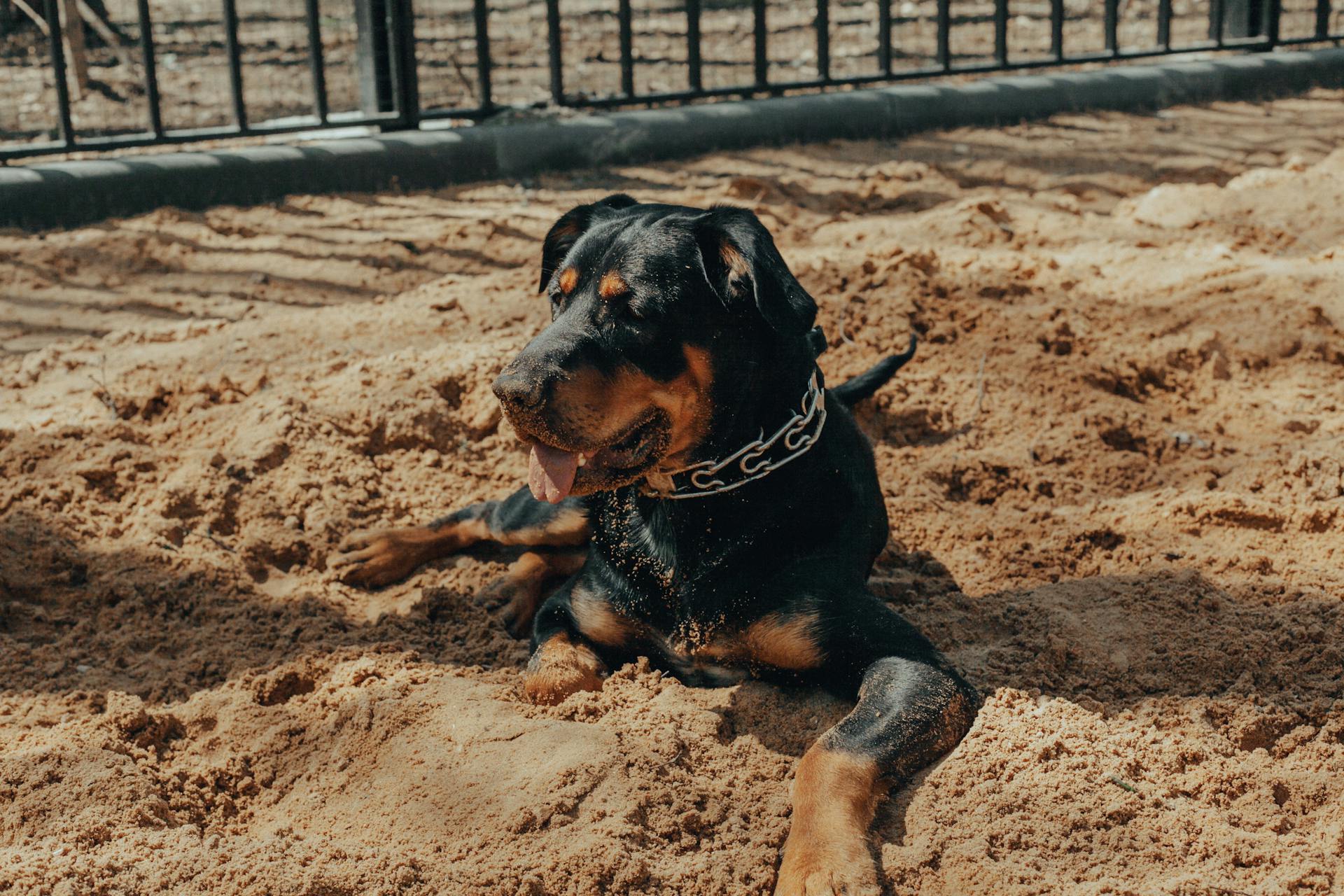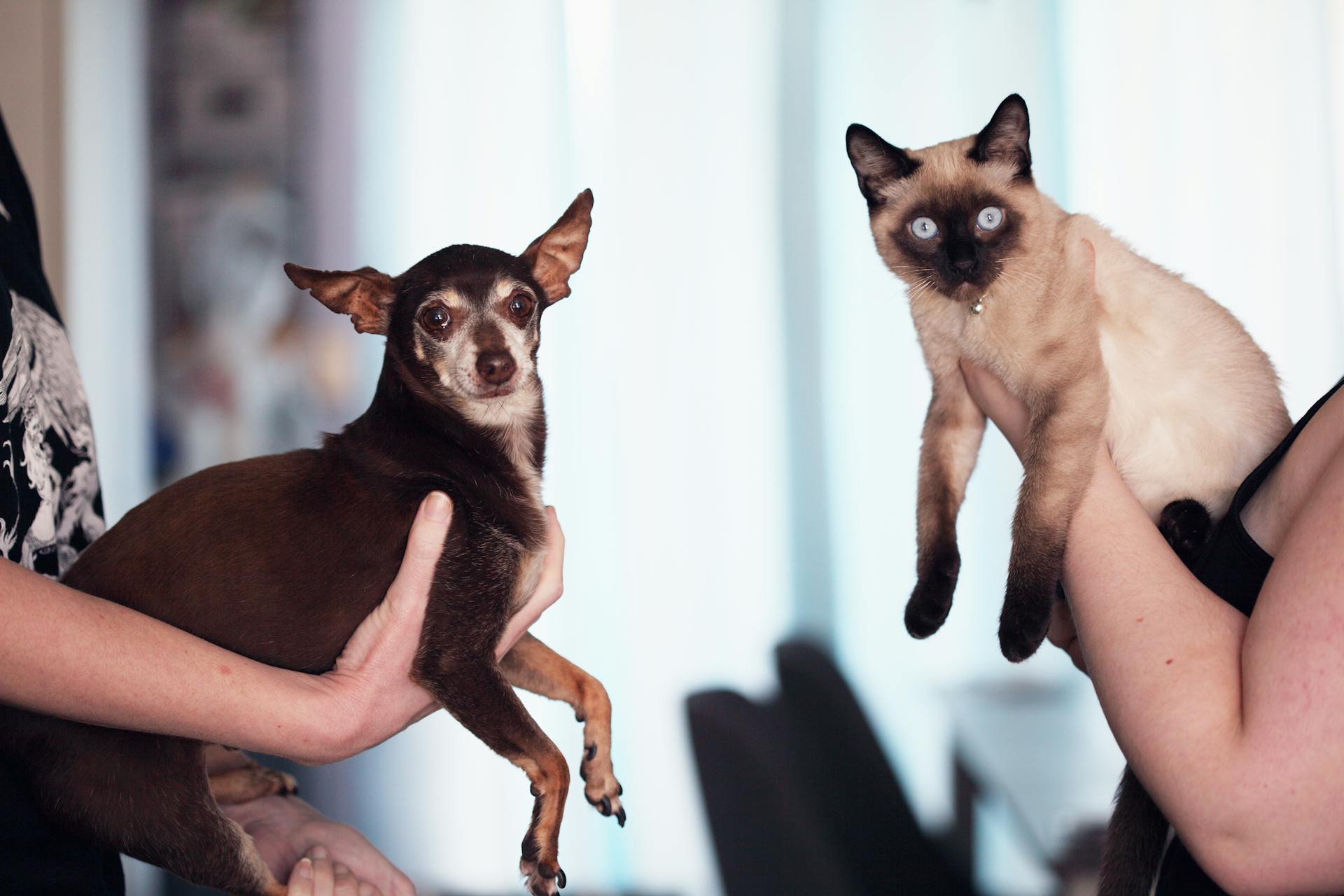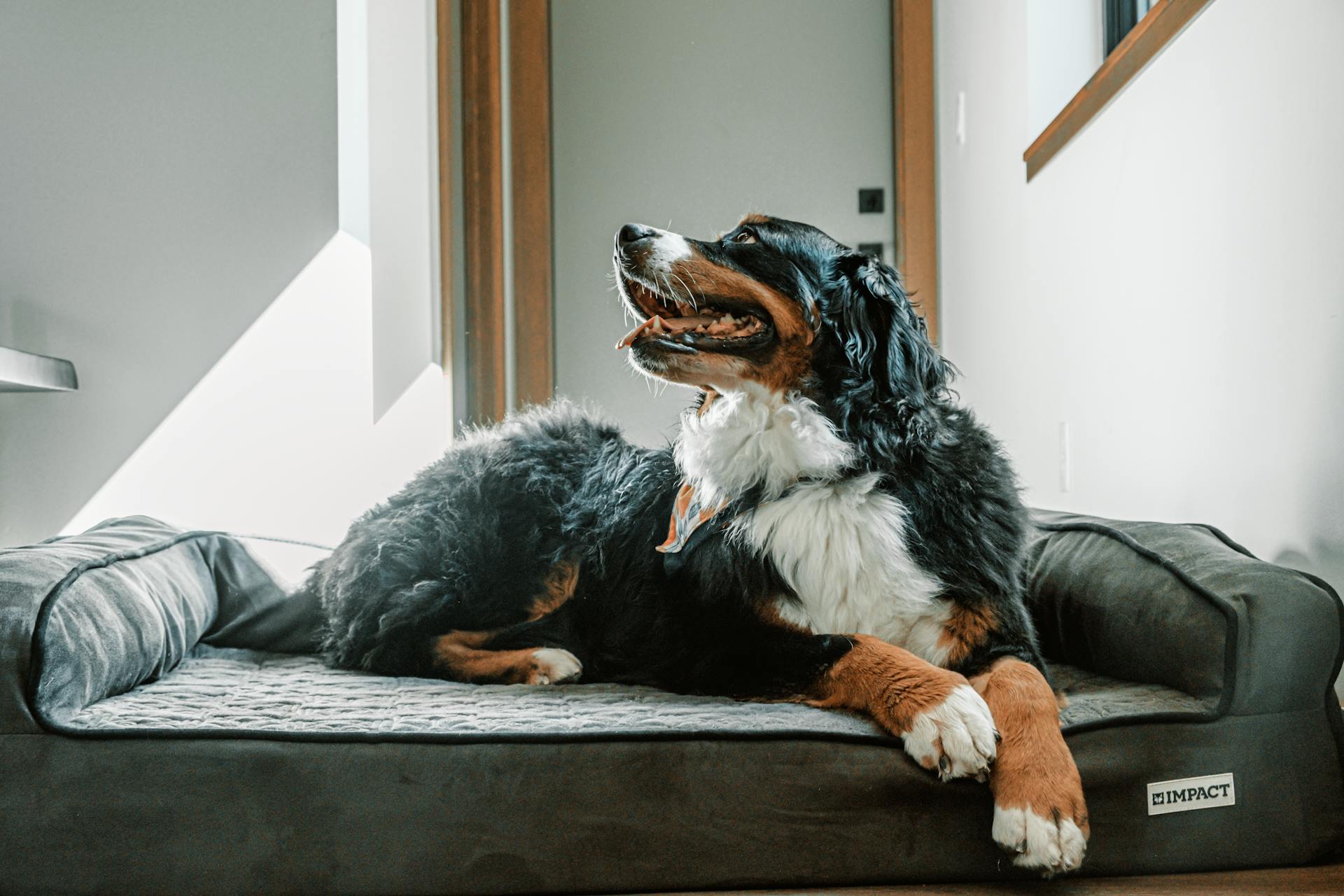
Rottweilers and other dogs can live harmoniously with proper socialization and training. Rottweilers are naturally loyal and protective of their family, but they can also be friendly and gentle with other dogs if taught to be so.
To ensure harmony, it's essential to socialize Rottweilers from an early age. This means exposing them to various environments, people, and other animals, starting from 8-10 weeks old. Consistency and patience are key in this process.
Rottweilers are pack animals and thrive in the presence of their human family. They can become wary of other dogs if they don't receive proper socialization. This can lead to aggression or fear-based behaviors, making it difficult to introduce them to other dogs.
Introducing Rottweilers to other dogs requires a gradual and controlled approach. Start by keeping them on a leash and allowing them to sniff each other at a safe distance.
Rottie 101
Rottweilers can be a sensible and level-headed addition to the family when given plenty of exercise.
Having two dogs does not require twice as much work as one dog, and the two could become close companions that keep each other company.
Rottweilers may suffer from separation anxiety if left alone for extended periods, which is a common issue for many owners.
The problem of aggression tends to be more pronounced in unneutered males, especially toward other males.
Socializing your Rottweiler when they are a puppy will mitigate most of these problems and can help them get along with other dogs, both in and out of the house.
Readers also liked: 2 Neutered Male Dogs Living Together
Living with Rottweilers
Living with Rottweilers requires attention to their socialization needs, which is crucial for them to be good family companions. They need continuous and extensive socialization to thrive in a household with children.
Rottweilers love being in the company of their owners and tend not to do well if left alone for long periods of time. This means they require regular interaction and attention from their family members.
Some Rottweilers tend to drool, especially large males with loose lips, which can be a consideration for owners who value a clean and tidy home.
If this caught your attention, see: Do Rottweilers Turn on Their Owners
Training and Care
Rottweiler training should start early in their life to help them grow into well-mannered adults. They need puppy socialization, consistent leadership, and basic training classes.
Rottweilers are smart, highly trainable, and eager to please, but they can sometimes be stubborn. They thrive on structure and clear boundaries.
Rottweilers excel in many canine sports and love walking, jogging, and swimming with their owners. They're quite athletic and require daily exercise to stay happy and healthy.
Curious to learn more? Check out: All about Dogs Dog Training
Medium Energy
Rottweilers are typically pretty laid back in the house, so they may be able to play with other dogs in your household without making a mess of the house.
Most Rottweilers are able to adjust their energy level to respond appropriately to dogs of various play styles.
Simple games in which Rottweilers lie down to play with another dog by mouthing at them or playing a low-key game of tug-of-war is pretty common in the breed.
This medium-level energy allows Rottweilers to adapt to both energetic and more laidback play companions.
Consider reading: Dog House
Care Tips
Rottweiler training should start early in their life with puppy socialization, consistent leadership, and basic training classes.
These dogs are smart, highly trainable, and eager to please, although they can sometimes be stubborn. Research the Rottweiler temperament and training needs before bringing one home.
Consult with your veterinarian, a dog trainer who has experience with Rottweilers, and your breeder to ensure your new Rottie puppy is set up for training success.
Daily exercise is essential for Rottweilers, who excel in many canine sports and love walking, jogging, and swimming. They're quite athletic and require regular physical activity.
Consistent training is key to helping your Rottweiler get along with other dogs, even if they don't always feel like it. With proper training, they can learn to do so.
Leashing your Rottweiler when new dogs arrive is crucial, especially in the first few minutes of meeting. This prevents aggression and makes it less likely that your dog will feel the need to protect.
Most Rottweilers do not have dog aggressive instincts, but rather protection or prey drive misfiring. Understanding these instincts and handling them properly is essential for a harmonious relationship with other dogs.
Recommended read: History of Rottweiler Dogs
A Docked Tail Can Interfere

Dogs use their tails to communicate with one another, and a Rottweiler's tail can convey their intentions to other dogs.
The way a Rottweiler carries their tail can signal to other dogs whether they're friendly or not, making it a vital part of their nonverbal language.
Without a tail, a Rottweiler may struggle to tell another dog to back off, which can lead to fights.
This lack of communication can be especially challenging in social situations, where body language plays a huge role in determining how other dogs react.
It's essential to consider the potential impact of docking a Rottweiler's tail on their ability to communicate with other dogs.
On a similar theme: Traits of Rottweilers
Socialization and Interactions
Socialization is key to having a Rottweiler who gets along with other dogs. Exposing your puppy to other dogs from an early age is crucial, and enrolling them in puppy classes is a great way to start.
You want to socialize your Rottweiler with as many different dogs in as many different situations as possible. This means exposing them to small, large, fluffy, and skinny dogs, and every other kind of dog you can think of.
A well-socialized Rottweiler can make friends at the dog park, but it's essential to pay close attention to their body language and ensure they're not feeling anxious or scared.
For more insights, see: How Many Types of Shih Tzus Are There
Socialize, Socialize, Socialize
Socialize, socialize, socialize - it's the key to raising a well-adjusted and friendly Rottweiler. The first and most crucial step to having a Rottweiler who loves the company of other dogs is to expose them to other dogs from an early age.
Start your Rottweiler in puppy classes as soon as possible, and once they're old enough, socialize them with as many different dogs in as many different situations as you can. Expose your Rottweiler to very small dogs, very large dogs, fluffy dogs, skinny dogs, and every other kind of dog that you can think of.
Dog parks can be a great opportunity for this kind of varied socialization, but it's also very important that your Rottweiler not have a bad experience. Scope out the park before you bring your dog in to be sure that no dog in the group seems aggressive or too intense for your Rottweiler pup.
Here's a good example of a well-socialized Rottie making some friends at the dog park:
- Very small dogs
- Very large dogs
- Fluffy dogs
- Skinny dogs
- Other kinds of dogs
Always make sure you're paying close attention to your Rottweiler and their new friends while looking for positive and loose body language.
German Shepherd
The German Shepherd is a confident breed that won't be easily pushed around.
They enjoy plenty of exercise, so walks are a great opportunity for them to socialize.
German Shepherds are intelligent and easy to train, which makes them a popular choice for many dog owners.
Both German Shepherds and Rottweilers have had to deal with the reputation for being aggressive, but with proper socialization, they can become well-adjusted and friendly dogs.
Their hard-working nature means they thrive on mental and physical stimulation, making regular exercise and training essential for their happiness and well-being.
You might like: Do Rottweilers Need a Lot of Exercise
German Shorthaired Pointer
The German Shorthaired Pointer is a great match for a Rottweiler, especially if you're an active owner who enjoys running with your dog. They have plenty of energy and will love going for a run with your Rottweiler.
These hunting dogs are fast and agile, making them a good playmate for a Rottweiler. They benefit from being trained off the leash, which allows them to run and charge around freely.
The German Shorthaired Pointer is a great choice if you're looking for a breed that can keep up with your Rottweiler's energetic personality.
Potential Issues
Rottweilers may not always get along with other dogs, particularly if they're not socialized properly from an early age.
Not every Rottweiler in every situation gets along well with other dogs, as some may have a strong prey drive or territorial instincts.
Rottweilers can be wary of other dogs, especially if they're not familiar with them, which can lead to aggression or fear-based behaviors.
In some cases, Rottweilers may have a history of fighting or aggression towards other dogs, making it challenging to introduce them to new canine companions.
Rottweilers may not always work well with other dogs due to their natural protective instincts, which can manifest as defensiveness or aggression towards other dogs.
Readers also liked: Dog to Dog Aggression
3 Companion Breeds
Rottweilers are known to have a very wrestle and play-fight-oriented play style, which means they tend to enjoy a good game of roughhousing.
Pit Bulls are a great match for Rottweilers, as they also have an intense, wrestle style play that will keep your Rottie engaged and happy.
Boxers are another breed that can keep up with a Rottweiler's energetic play style, and they often develop a strong bond with Rottweilers.
Rottweilers often play best with other dogs that have a similar play style, which is why they tend to get along well with other Rottweilers.
Training a solid recall for your Rottweiler can help prevent dog fights by allowing you to call your Rottie off when necessary, making it easier to monitor their play and ensure they're not overwhelming the other dog.
Recommended read: How Long Are Rottweilers in Heat
Frequently Asked Questions
Are Rottweilers safe around small dogs?
Rottweilers can be safe around small dogs with proper introductions, training, and socialization. However, individual temperaments and supervision are crucial to ensure a peaceful coexistence.
Sources
- https://www.dogster.com/dog-breeds/are-rottweilers-good-with-other-dogs
- https://www.greencrossvets.com.au/pet-library/dogs/breed-guides/rottweiler-owners-guide/
- https://www.pawlicy.com/blog/rottweiler-dog-breed/
- https://www.a-love-of-rottweilers.com/rottweilers-do-they-mix-with-other-dogs-in-the-family-and-small-children.html
- https://notabully.org/how-do-rottweilers-get-along-with-other-dogs/
Featured Images: pexels.com


